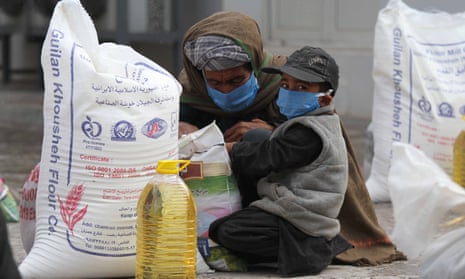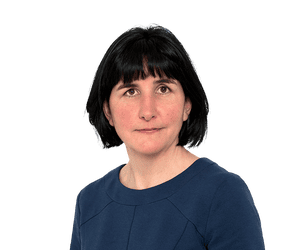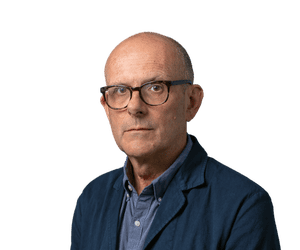We’ve launched a new blog at the link below – head there for rolling coverage of the coronavirus pandemic from around the world:
World Health Assembly passes resolution to investigate global pandemic response – as it happened
Canada-US border to remain closed; Barcelona beaches to reopen as Spain death toll below 100 for third consecutive day. This blog is now closed
Tue 19 May 2020 19.34 EDT
First published on Mon 18 May 2020 19.25 EDT- Summary
- Cambridge University will not hold traditional lectures
- Summary
- Covid-19 crisis will push 60m into poverty says World Bank chief
- UK reports 545 deaths from Covid-19
- Spain death toll below 100 for third consecutive day
- Canada-US border to remain closed until 21 June
- WHO assembly approves Covid-19 response audit
- Barcelona to reopen beaches
- Al Aqsa mosque to reopen next week
- Afghanistan sees biggest one-day rise in new infections
- Summary
- China says US trying to shift blame for mishandling coronavirus crisis
- Russia coronavirus cases edge towards 300,000
- Unemployment surges in the UK
- Czech coronavirus cases show biggest jump in four weeks
- Summary
- UK front pages Tuesday, 19 May
- India cases pass 100,000
- Summary
- Trump accuses WHO of 'alarming lack of independence' from China
- Trump warns WHO must make 'major improvements' or funding freeze to be 'permanent'
- Deaths in Australia reach 100
- Trump calls WHO a "puppet" of China, confirms he is considering slashing funding
- Brazil cases overtake UK to become third-highest worldwide
- White House spokesperson confirms Trump is taking hydroxychloroquine
- Trump's physician releases memo on use of hydroxychloroquine
- IMF chief says full economic recovery unlikely in 2021
- US deaths pass 90,000
- WHO chief promises review of coronavirus response
- Summary

Live feed
- Summary
- Cambridge University will not hold traditional lectures
- Summary
- Covid-19 crisis will push 60m into poverty says World Bank chief
- UK reports 545 deaths from Covid-19
- Spain death toll below 100 for third consecutive day
- Canada-US border to remain closed until 21 June
- WHO assembly approves Covid-19 response audit
- Barcelona to reopen beaches
- Al Aqsa mosque to reopen next week
- Afghanistan sees biggest one-day rise in new infections
- Summary
- China says US trying to shift blame for mishandling coronavirus crisis
- Russia coronavirus cases edge towards 300,000
- Unemployment surges in the UK
- Czech coronavirus cases show biggest jump in four weeks
- Summary
- UK front pages Tuesday, 19 May
- India cases pass 100,000
- Summary
- Trump accuses WHO of 'alarming lack of independence' from China
- Trump warns WHO must make 'major improvements' or funding freeze to be 'permanent'
- Deaths in Australia reach 100
- Trump calls WHO a "puppet" of China, confirms he is considering slashing funding
- Brazil cases overtake UK to become third-highest worldwide
- White House spokesperson confirms Trump is taking hydroxychloroquine
- Trump's physician releases memo on use of hydroxychloroquine
- IMF chief says full economic recovery unlikely in 2021
- US deaths pass 90,000
- WHO chief promises review of coronavirus response
- Summary
Beyond the hot spots of Brazil and Mexico, the coronavirus is threatening to overwhelm Latin American cities large and small in an alarming sign that the pandemic may be only at the start of its destructive march through the region.
More than 90% of intensive care beds were full last week in Chile’s capital, Santiago, whose main cemetery dug 1,000 emergency graves to prepare for a wave of deaths, AP reports.
In Lima, Peru, patients took up 80% of intensive care beds as of Friday. Peru has the world’s 12th-highest number of confirmed cases, with more than 90,000.
“Were in bad shape,” said Pilar Mazzetti, head of the Peruvian governments Covid-19 task force. “This is war.”

In some cities, doctors say patients are dying because of a lack of ventilators or because they couldn’t get to a hospital fast enough. With intensive care units swamped, officials plan to move patients from capitals like Lima and Santiago to hospitals in smaller cities that aren’t as busy running the risk of spreading the disease further.
Latin American countries halted international flights and rolled out social distancing guidelines around the same time as the US and Europe, delaying the arrival of large-scale infection, said Dr. Marcos Espinal, director of communicable diseases at the Pan American Health Organization.
Latin America is the worlds most unequal region, a reality that Espinal said made it difficult to balance health and economic growth, with millions facing increased poverty during quarantines, curfews and shutdowns.
Summary
Here are the key developments from the last few hours:
- The Covid-19 crisis could push 60 million people into poverty, the head of the World Bank, David Malpass, said. Malpass said his bank had so far loaned money to about 100 countries, accounting for 70% of the world’s population.
- The World Health Organization’s annual assembly passed a resolution on the need to investigate the global response to the pandemic. None of the WHO’s 194 member states raised objections to the resolution brought by the EU on behalf of more than 100 countries.
- The UK reported 545 more deaths, taking its total to 35,341. The environment secretary, George Eustice, announced the latest figure at the government’s daily briefing on the epidemic. The UK remains the world’s second-worst affected country by deaths after the US.
- Rishi Sunak, the UK’s chancellor, said the country is facing “a severe recession the likes of which we haven’t seen”. Giving evidence to the Lords economic affairs committee, he said he expects the unemployment rate to be in double figures by the end of the year.
- Cambridge University will not hold traditional lectures in the 2020/21 academic year.There will be no “face-to-face lectures” at the University of Cambridge in the 2020/21 academic year, the institution has said. Lectures will continue virtually, while it may be possible for smaller teaching groups to take place in person if it conforms to social distancing requirements.
- Afghanistan recorded its biggest one-day rise in infections as about half of tests done in a 24-hour period came back positive. The health ministry confirmed 581 new cases out of 1,200 tests, marking the country’s worst day of the crisis – the previous high was 414.
- The border between Canada and the US will remain closed to non-essential travel until 21 June. The closure was set to expire this week after the two governments announced a 30-day extension of the restrictions last month.
- Spain reported a death toll below 100 for the third consecutive day, confirming 83 deaths from coronavirus in the past 24 hours. The latest figures from the health ministry showed the majority of the latest deaths were in some of the hardest-hit areas of the country.
- The Al-Aqsa mosque, Islam’s third holiest site, will reopen next week, authorities said. The Islamic endowment overseeing the site in Jerusalem under Jordanian custodianship had taken the unprecedented step of closing it to worshippers in March.
- People living within a kilometre of Barcelona’s beaches will be able to return to the sand from Wednesday, as the local lockdown eases. People will be able to make “recreational use” of the Catalan capital’s beaches as long as they respect physical distancing.
- Half a dozen people from three English Premier League football clubs tested positive for Covid-19 in the space of two days, dealing a blow to hopes of top-flight English football resuming next month.
Trump has signed an executive order encouraging agencies to cut regulations in the name of economic recovery.
“Agencies must continue to remove barriers to the greatest engine of economic prosperity the world has ever known: the innovation, initiative, and drive of the American people,” the order states.
President Trump signs Executive Order giving Cabinet members authority to cut regulations.
— CSPAN (@cspan) May 19, 2020
Full video here: https://t.co/1NXrzbhqNL pic.twitter.com/P6j6ikzavC
Hi, Helen Sullivan with you now. I’ll be bringing you the latest coronavirus news from around the world for the next few hours.
Please do get in touch with any comments, questions, tips, stories or jokes on Twitter @helenrsullivan or via email: helen.sullivan[at]theguardian.com.

Two months ago, he was simply Capt Tom Moore.
When his fundraising exploits inspired the nation, he was made an honorary colonel to mark his 100th birthday.
And now, the British war veteran whose sponsored walks in his garden raised £33m for NHS charities, is to receive a knighthood.

Donald Trump has reignited a controversy over the antimalarial drugs chloroquine and hydroxychloroquine after telling reporters he was taking the latter to protect himself against coronavirus. What do we know about these drugs?
What is hydroxychloroquine?
Hydroxychloroquine, which Trump says he has been taking for about two weeks, was developed as an antimalarial but it is also used to treat conditions like lupus, an anti-immune disease, and arthritis, where it can help combat inflammation. It has been licensed for use in the US since the mid 1950s and is listed by the World Health Organization as an “essential” medicine.
What’s the state of the current evidence?
In May, the British Medical Journal reported on a randomised (although still problematic) clinical trial in China that found little evidence hydroxychloroquine worked, with serious adverse events noted in two patients.
A second study reported in the BMJ last week on a French trial also concluded that hydroxychloroquine does not significantly reduce admission to intensive care or improve survival rates in patients hospitalised with pneumonia owing to Covid-19. Overall, 89% of those who received hydroxychloroquine survived after 21 days, compared with 91% in the control group.
The US Food and Drug Administration in a safety alert issued on 24 April warned that it had received reports that hydroxychloroquine and chloroquine could have serious side-effects and that the drugs should be taken only under the close supervision of a doctor in a hospital setting or a clinical trial.
What are the risks in taking hydroxychloroquine?
There are several side-effects. The most serious is that it can interfere with the rhythm of the heart. Other side-effects include headache, dizziness, nausea, vomiting, stomach pain, skin rash or itching or hair loss. Research published by the Mayo Clinic has suggested that “off-label” repurposing of drugs such as hydroxychloroquine could lead to “drug-induced sudden cardiac death”.
Although Trump’s official physician has said he was in “very good health” at his last official checkup, the president is 73 and his recorded weight would put him in a BMI category of “clinically obese”.
In the US, Donald Trump has claimed that scientists carried out a study of the effects of hydroxychloroquine, the results of which suggested he is wrong to tout it, because they oppose him politically.
The study of hundreds of patients at US veterans health administration medical centers showed that those who took hydroxychloroquine had a 27.8% death rate, while those who did not had an 11.4% death rate. Trump said:
"That was a false study done. Where they gave it very sick people. Extremely sick people. People that were ready to die. It was given by obviously not friends of the administration" -- Trump defends hydroxychloroquine by suggesting a study of VA patients was fruit of a conspiracy pic.twitter.com/a3neqa2U4y
— Aaron Rupar (@atrupar) May 19, 2020
Joanna Walters writes that Trump also falsely claimed evidence suggests hydroxychloroquine does not have negative side effects. In reality, the Food and Drug Administration has said it should only be used as a coronavirus treatment in hospital settings due to “reports of serious heart rhythm problems” in virus patients who had received the drug.
When a reporter mentioned the FDA guidance, Trump said, “That’s not what I was told.”
*We originally inaccurately reported that this study was published in the New England Journal of Medecine. The research was published as a pre-print — it has not yet gone through a rigorous process of peer review.
The US Centers for Disease Control and Prevention (CDC) has reported 933 more deaths and 24,481 more cases, taking the totals to 90,340 and 1,504,830, respectively.

Donald Trump has announced that he will sign an executive order directing federal agencies to eliminate “unnecessary regulations that impede economic recovery”. According to Reuters, he told a Cabinet:
I’m directing agencies to review the hundreds of regulations we’ve already suspended in response to the virus and make these suspensions permanent where possible.
President Trump is signing an exec order directing agencies to slash regulations. Outside conservative groups have been pushing this version of Phase 4 relief - stimulating the economy through deregulation instead of another trillion dollar relief package. #COVID19 pic.twitter.com/zOFQ3vd0PV
— Paula Reid (@PaulaReidCBS) May 19, 2020
Trump also tweeted this. Hand-shaking, back-slapping, not a mask in sight:
THANK YOU @SenateGOP! https://t.co/wbgqxD6TPR
— Donald J. Trump (@realDonaldTrump) May 19, 2020
This as the Senate majority leader Mitch McConnell, Republican of Kentucky, said any action on a new pandemic response bill could be weeks away.
Cambridge University will not hold traditional lectures
There will be no “face-to-face lectures” at the University of Cambridge in the 2020/21 academic year, the institution has said.
Lectures will continue virtually, while it may be possible for smaller teaching groups to take place in person if it conforms to social distancing requirements. A spokesman for the university said:
The university is constantly adapting to changing advice as it emerges during this pandemic.
Given that it is likely that social distancing will continue to be required, the university has decided there will be no face-to-face lectures during the next academic year.
Lectures will continue to be made available online and it may be possible to host smaller teaching groups in person, as long as this conforms to social distancing requirements.
This decision has been taken now to facilitate planning but, as ever, will be reviewed should there be changes to official advice on coronavirus.
Officials in the Bolivian city of Trinidad are to give out free doses of the anti-parasite drug ivermectin in a bid to combat the epidemic. Authorities will go house-to-house to pass out about 350,000 doses of the drug in an area that has seen 581 confirmed cases and 41 deaths.
The Ministry of Health said it can be used under proper medical protocol, while noting the lack of evidence for it as a treatment for Covid-19. The health minister Marcelo Navajas told local media:
It is a product that does not have scientific validation in the treatment of the coronavirus. It does serve to treat parasitic diseases and other types of diseases. Therefore, we ask our medical colleagues who are going to use this product to do so with informed consent.
McDonald’s has been accused of endangering employees and their families by failing to adopt government safety guidance during the pandemic.
Five workers in Chicago have filed a class action lawsuit against the chain, saying it failed to provide adequate hand sanitiser, gloves and masks. They also allege that McDonald’s has not been notifying staff when an employee became infected.
McDonald’s said the allegations were inaccurate and that safety, including wellness checks and protective gear, was a top priority.
The Trump administration is poised to extend non-essential travel restrictions at the land borders with Canada and Mexico, the acting US Department of Homeland Security chief Chad Wolf has indicated.
We really have to see what is the health care situation like in Mexico and Canada, how are their cases, have they hit their curve?
What we don’t want to do is try to open up parts of our economy and have a lot of folks coming across the border that we haven’t seen in the past 50 or 60 days.
Canada’s prime minister Justin Trudeau had already said his country and the US have agreed to extend the ban at their shared border by another 30 days, after reports earlier in the day suggested such a move was likely.